 Formula 1 Research & Education (F1RE) Centre
Formula 1 Research & Education (F1RE) Centre
Opened on 6th December 2000, by Nigel Mansell; Grand Fellow of the MIRCE Akademy, to facilitate MIRCE Science based approach to F1 Grand Prix Racing process with the following objectives:
1: To understand the time evolution of functionability of F1 Racing System
To achieve this objective the Centre continuously collects and analyses, available after-race functionability data, by applying MIRCE Science methods, developed at the MIRCE Akademy, to understand the natural and human actions that shape the functionability performance like driver, rolling-chases, engine, tyres, circuit, regulations, team, competitors, weather and many other elements of the functionability.
2: To Predict F1 Functionability Performance
To achieve this objective the Centre applies MIRCE Science probabilistic methods, developed at the MIRCE Akademy, to derive mathematical models for the prediction of the F1 functionability performance for a given design, tactical and environmental conditions, at design stages when changes are possible at no extra cost and time. This is equally powerful and needed as CFD models and calculations, which have fundamentally, change the F1 design process, but still ignored functionability events (failure and repair processes, natural environment on the day and the impacts of drivers and teams).
3: To annually recognise the Formula 1 Functionability Champion Team and Driver
To achieve this objective the Centre has developed a special method for calculating the Teams and Drivers F1 Champions for each season, based on the publicly available FIA information. Thus, the Centre produces annually the F1 Functionability Table as a basis for the Award of the F1 Driver Functionability Champion and the F1 Team Functionability Champion.
Formula 1 Functionability
Formula 1 Functionability analysis is on going research performed at the Akademy that facilitates the scientific understanding of physical mechanisms and human actions that generated occurrences of functionability events through the Grand Prix Racing Process. As results of these analyses the MIRCE Akademy annually recognises the Team and the Driver who were the most successful, from functionability point of view, by presenting two F1 Functionability Awards entitled:
- The F1 Driver Functionability Champion
- The F1 Team Functionability Champion
The Awards are based on the corresponding F1 Functionability Tables, which are produced by the Akademy, based on the official FIA organised Formula 1 World Championship data. (see www.formula1.com)
To see the illustrative history of F1 Functionability Awards please click here.
F1 Functionability Award for Drivers
MIRCE Science defines the F1 Driver’s Functionability: “The ability of the Driver to successfully cross the finish line in all F1 Grand Prix races in the FIA organised Formula One World Championship season.”
The MIRCE Akademy Regulations: A Driver will be awarded one point for every race finished, or a portion of it. For every unfinished race, caused by the Team’s error, the driver will be awarded the proportion of the point corresponding to the portion of the race completed. For every unfinished race, caused by the Driver's error, no portion of a point will be awarded. All races count. The Drivers’ title of the F1 Driver Functionability Champion will be awarded to the Driver(s) who is placed at the top of the F1 Functionability Table for Drivers, produced by the MIRCE Akademy, compiled at the end of the each season.
F1 Driver Functionability Champions
| F1 Season | Driver | Functionability |
| 2020 | Kimi Raikkonen | 0.975 |
| 2019 | Louis Hamilton | 1.000 |
| 2018 | Louis Hamilton | 0.994 |
| 2017 | Louis Hamilton | 0.991 |
| 2016 | Daniel Ricciardo | 0.999 |
| 2015 | Sergio Perez | 0.978 |
| 2014 | Jenson Button | 0.988 |
| 2013 | Jenson Button | 0.996 |
| 2012 | Kimi Raikkonen | 0.999 |
| 2011 | Jenson Button | 0.965 |
| 2010 | Felipe Massa | 0.946 |
| 2009 | Rubens Barrichello | 0.988 |
| 2008 | Nick Heidfeld | 0.996 |
| 2007 | Nick Heidfeld | 0.966 |
| 2006 | Fernando Alonso | 0.923 |
| 2005 | Tiego Monteiro | 0.944 |
| 2004 | Rubens Barrichello | 0.944 |
| 2003 | Michael Schumacher | 0.935 |
| 2002 | Michael Schumacher | 1.000 |
| 2001 | Jean Alesi | 0.941 |
| 2000 | Mika Hakkinen | 0.921 |
F1 Functionability Award for Teams
MIRCE Science defines the F1 Team’s Functionability as: “The ability of the Team to successfully cross the finish line in all F1 Grand Prix races in the FIA organised Formula One World Championship season.”
The MIRCE Akademy Regulations: A Team will be awarded one point for every race finished by each driver, or a portion of it. For every unfinished race, caused by the Drivers’ error, the team will be awarded the proportion of the point corresponding to the portion of the race completed. For every unfinished race, caused by the Team’s error, no portion of a point will be awarded. All races for both drivers count. The Teams’ title of the F1 Team Reliability Champion will be awarded to the Team(s) that is placed at the top of the F1 Functionability Table for Teams, produced by the MIRCE Akademy, at the end of the each season.
F1 Team Functionability Champions
| F1 Season | Team | Functionability |
| 2020 | Mercedes AMG Petronas | 0.949 |
| 2019 | Mercedes AMG Petronas | 0.990 |
| 2018 | Mercedes AMG Petronas | 0.994 |
| 2017 | Mercedes AMG Petronas | 0.934 |
| 2016 | Mercedes AMG Petronas | 0.928 |
| 2015 | Mercedes AMG Petronas | 0.921 |
| 2014 | Scuderia Ferrari | 0.918 |
| 2013 | McLaren-Mercedes | 0.942 |
| 2012 | Scuderia Ferrari | 0.941 |
| 2011 | Red Bull Racing - Renault | 0.949 |
| 2010 | Scuderia Ferrari | 0.968 |
| 2009 | Brawn-Mercedes | 0.941 |
| 2008 | BMW Sauber | 0.983 |
| 2007 | McLaren Mercedes | 0.974 |
| 2006 | Scuderia Ferrari | 0.876 |
| 2005 | Panasonic TOYOTA | 0.813 |
| 2004 | Scuderia Ferrari | 0.997 |
| 2003 | BMW Williams F1 | 0.863 |
| 2002 | Scuderia Ferrari | 0.853 |
| 2001 | Marlboro Ferrari | 0.832 |
| 2000 | Mclaren-Mercedes | 0.8125 |
|
N. Mansell, Mr Morris (BMW WilliamsF1), Dr. Knezevic |
N. Mansell, Dr. Knezevic & P. Brown (Ferrari) |
|
Panasonic Toyota presentation for Functionability - N. Mansell and Dr Knezevic, 2005
|
Ms Annuck receiving the Drivers Functionability Award for 2005 on behalf of Tiego Monteiro |
|
Dr Knezevic presenting the F1 Team Functionability Award for 2008 to Dr Mario Theissen, BMW Team Principal, and Nick Heidfeld, the F1 Driver Functionability Award, for 2008 the BMW Sauber Centre,in Hinwil , Switzerland. |
Dr Knezevic presented F1 Team Functionability Award for 2012 to Lanzone, Production Director of Scuderia Ferrari, Direzione Gestione Corse |
|
|
|
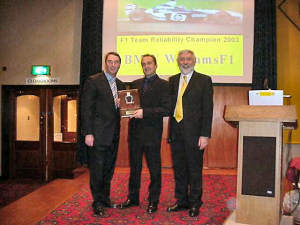
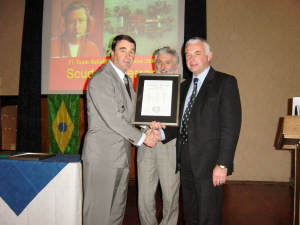
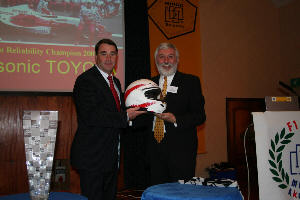
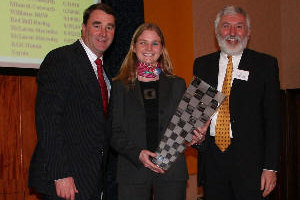
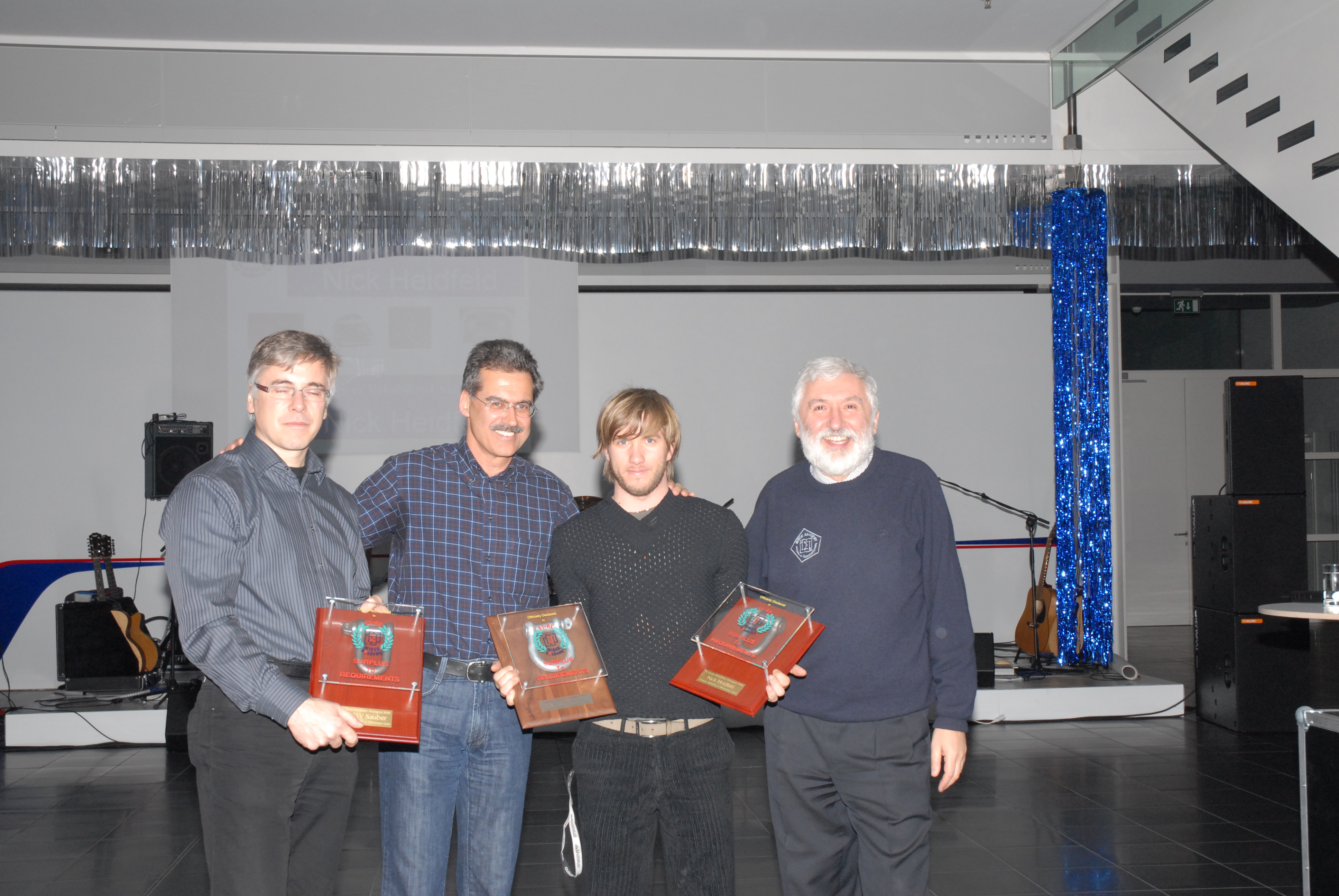
.jpg)